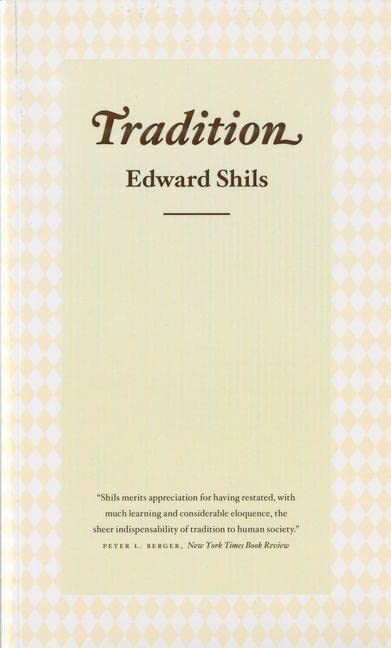Customer Services
Copyright © 2025 Desertcart Holdings Limited


Tradition
A**R
this book is the best resource I have found and would highly recommend it
Outside of T.S. Eliot's seminal prose work "Tradition and the Individual Talent", this book is the best resource I have found and would highly recommend it. It is an inquiry into the common grounds of elements that make up the contortion of traditions and it shows that E. Shils spent a lifetime of work revealing the nature of this topic. Other books will usually site by example but not speak directly about what tradition really means.Shils does this conclusively, magnanimously by pointing out why one finds it a topic of obscurity in our current milieu,and because the accent of intellectual inquiry is usually on a movement forward from associations for the past and in what we normally call "improvement"For yet another perspective, I would also recommend another slim paperback: Christian and Oriental Philosophy of Art, Coomaraswamy, Ananda K. 0486203786
J**S
Five Stars
very pleased. would definitely buy from them again
J**N
Five Stars
Love it!
N**M
The Need For Tradition.
The book _Tradition_ by Edward Shils is a fine sociological essay examining the role played by tradition in societies and cultures as well as governments, arts, literatures, sciences, and philosophies. Shils writes that this book is intended to fill a gap in modern sociology, that is the gap which exists because of a neglect to emphasize the role of tradition. While some sociological theorists such as Max Weber and Vilfredo Pareto (and especially the Christian poet and writer T. S. Eliot) have incorporated notions of tradition into their theories, for the most part modern sociology fails to appreciate the role played by and the need for tradition. Shils defines tradition in its most basic form to be "a traditium; it is anything which is transmitted or handed down from the past to the present. (p. 12)" All too often those who argue for the need for tradition are dismissed as mere "reactionaries" while the ideal of progress is heralded in opposition. Shils argues however that the idea of progress itself has constituted a tradition in that the movements and ideologies focusing on progress have outlasted a single generation. Much of this book is spent explaining the various roles tradition plays in society and in the world of ideas. Thus, there are chapters focusing on the role of the past, the endurance of past objects, the endurance of past practices, stability and change in tradition, endogenous and exogenous factors behind the change in a tradition, tradition and rationalization, and the prospects of tradition into the future. While religious practices and governments clearly constitute a tradition, and while movements in literature and the arts also constitute traditions, it is not so obvious that tradition exists in the sciences and philosophy which attempt to base themselves entirely on a rational mode of inquiry. However, even here Shils argues that science itself and the branches of philosophy are based on a tradition (which is the inherited mode of inquiry itself). A good part of Shils' book is spent explaining precisely how this tradition plays a part in the sciences and in philosophy as well as other movements which are based on "rationality". Thus, it is naive to dismiss tradition as mere superstition or prejudice when it in fact underlies the sciences - the very beacons of rationality. With the Enlightenment and modernism came along traditions which advocated the ideal of progress. However, Shils argues that perhaps these traditions (while offering much good to mankind in the way of removing past prejudices and misconceptions and offering things new) have gone too far and now need to be curtailed somewhat. Interestingly, the tradition of complete anti-traditionalism (or nihilism) is a particularly dangerous development in the history of tradition. Nihilism brings with it decadence and a loss of meaning in society. Philosophers such as Nietzsche and historical theorists such as Spengler wrote much about the dangers of nihilism in the earlier part of this last century. Shils argues that he would like to see many traditions conserved; however, he does recognize the need for change in certain things. It is a precarious balance that must be exacted between the role of strict traditionalism and the role of progress. Nevertheless, Shils notes that the voice of tradition must be heard and all too often it is silenced in today's debates over change and progress. Tradition may have much that is good and stable in it. And, progress brings new dangers and instates new practices which may have similar or substantially different problems than those experienced in the traditional practices. Thus, it is apparent that a somewhat conservative attitude must be taken with respect to progress in order to avoid some of the dangers and uncertainty which result from excessive change. The forces of progress and those of tradition must be balanced. Most would agree with this idea, but the precise place where that balance is to be obtained is usually controversial (with respect to any given tradition). Shils' book offers an excellent analysis of the role of tradition in cultures and societies and of the need for tradition in the modern world.
Trustpilot
2 days ago
2 months ago
1 month ago
1 month ago